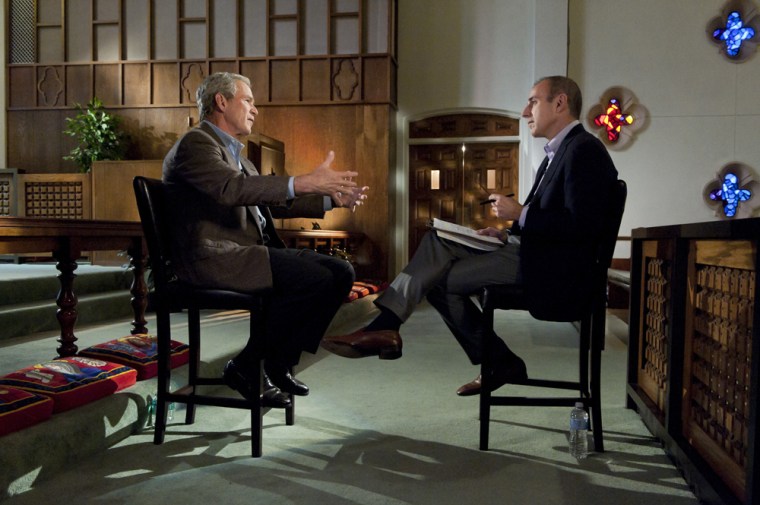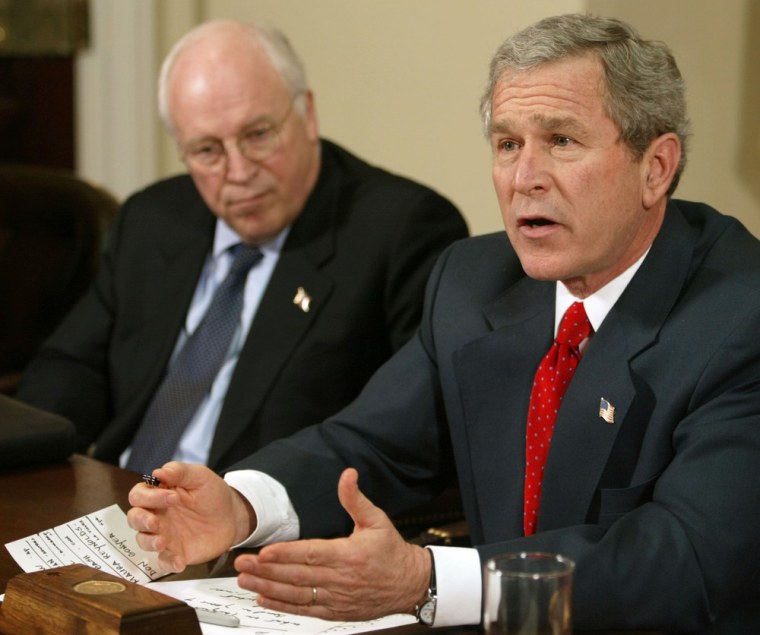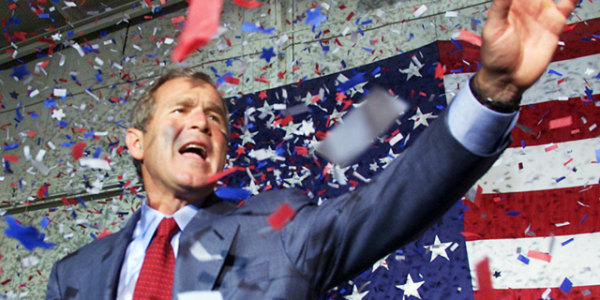Former President George W. Bush admits in his memoir “Decision Points” that his 2003 “Mission Accomplished” speech and his demeanor in the aftermath of Hurricane Katrina were some of the professional and personal mistakes that he made. In his first one-on-one television interview since leaving the White House, the former president sat down with Matt Lauer and opened up about his regrets.

Bush looked back on May 1, 2003, when he stood on the deck of the USS Abraham Lincoln aircraft carrier under a banner saying “Mission Accomplished” and declared that major combat operations in Iraq had ended, as a statue of Saddam Hussein was brought crashing down.
“No question it was a mistake,” Bush told Matt Lauer of the scene that still reverberated seven years later as the war raged on. “If I had to do it all over again, which you don't get to do when you're the president, you know, I’d have said, ‘Good going, men and women, great mission’ or something.”
Bush said that he was caught up in an “exhilarating moment,” and writes in the book that he should have listened the advice he gave others.
“Shortly thereafter I said, ‘Hey — we’re not doing any victory dances,’ because I knew full well the task at hand was gonna be very difficult,” he told Lauer.
He also wrote of many errors involving the Iraq campaign and the failure to find weapons of mass destruction there, despite numerous intelligence reports pointing to their existence.
“No one was more shocked or angry than I was when we didn’t find the weapons. I had a sickening feeling every time I thought about it. I still do,” Bush writes.
“Was there ever any consideration of apologizing to the American people?” Lauer asked.
“I mean, apologizing would basically say the decision was a wrong decision,” Bush replied. “And I don’t believe it was the wrong decision. I thought the best way to handle this was to find out why. And what went wrong. And to remedy it.”
‘Out of touch’ with Katrina victims
Blamed by many Americans for a bungled response to Hurricane Katrina in 2005, Bush said his initial mistake was failing to communicate his concern for the storm’s victims, many of whom were black.
He said he should not have done an Air Force One flyover of New Orleans while much of the city was under water. “Huge mistake,” he told Lauer.
The photo of Bush peering out the window of Air Force One at the storm-ravaged region made him look, in his words, “detached and uncaring.” Bush told Lauer that he did not land because he did not want to divert police officers helping hurricane victims to providing security for him instead.
He also looked back at the words that would come to represent even more of a disconnect with Katrina victims. “Brownie, you are doing a heck of a job,” he told then-FEMA director Michael Brown, as images of horrifying destruction were broadcast and subsequent reports criticized FEMA’s handling of the disaster.
“I tend to boost people’s spirits during difficult times. Basically what I was saying …‘Good job. You’re doing what we expect you to do,’ ” Bush explained to Lauer.
“That’s not what we were seeing,” Lauer interjected.
“Yeah … as president sometimes your intentions get overwhelmed by perception. And it turns out that — those words became a club for people to say, ‘Wait, this guy’s out of touch.’ ”
Accusations from critics that he was racist because of the response to Katrina “was the worst moment of my presidency. I feel the same way today,” he writes.
In his interview with Bush, Lauer recalls singer Kanye West’s unexpected deviation from the script during an NBC telethon asking for help for Katrina victims. When it was West’s turn to speak, he said, “George Bush doesn’t care about black people.”
“That [means] ‘he’s a racist,’ ” Bush tells Lauer. “And I didn’t appreciate it then. I don’t appreciate it now ... I resent it, it’s not true, and it was one of the most disgusting moments in my presidency.”
“You’re not saying that the worst moment in your presidency was watching the misery in Louisiana,” Lauer says. “You’re saying it was when someone insulted you because of that.”
“No — that — and I also make it clear that the misery in Louisiana affected me deeply as well,” Bush replies. “There’s a lot of tough moments in the book. And it was a disgusting moment, pure and simple.”
Abu Ghraib and Rumsfeld
Bush recalled his immediate reaction to seeing photos in 2004 that showed American soldiers at the Abu Ghraib prison mistreating and humiliating inmates.
“[I was] sick to my stomach,” Bush said. “Not only have they mistreated prisoners, they had disgraced the U.S. military and stained our good name.” Bush explained that he felt “blindsided” because he “wasn’t aware of the graphic nature of the pictures until later on.”
When Secretary of Defense Donald Rumsfeld twice offered his resignation, Bush said he considered it.
“I seriously considered accepting his advice,” he writes in the book. “I knew it would send a powerful signal to replace the leader of the Pentagon after such a grave mistake. But a big factor held me back — there was no obvious replacement for Don.”
When Lauer questioned the logic, Bush explained, “We’re in the middle of war and if I couldn’t have found somebody quickly to replace Secretary Rumsfeld, you’d have been on TV saying, ‘There’s a vacuum at the Pentagon.It’s sending terrible signals to our troops.’ ”
Bush told Lauer that he still thinks he made the right decision, keeping Rumsfeld on for two more years.
‘Bush’s brain’
Lauer asked the former president point-blank for his thoughts on rumors that senior adviser Karl Rove was “Bush’s brain” and that Vice President Dick Cheney really ran the White House. “Did it sting?” Lauer asked.
“No, no it didn’t sting at all because the so-called ‘Bush’s brain’ and Dick Cheney knew full well that one wasn’t my brain and the other one wasn’t running the White House,” Bush said, laughing. “Look, when you’re the president, there’s all kinds of things said about us. I mean, it’s just the nature of the job.”
Bush and Cheney didn’t always see eye to eye. He revealed that Cheney became “angry” in 2007 when the president decided not to pardon former Cheney aide I. Lewis “Scooter” Libby after Libby was sentenced to 30 months in federal prison.
Bush commuted the prison portion of Libby’s sentence, but allowed the jury’s verdict, fine and community service to stand, which upset Cheney. Libby was convicted of lying to federal agents investigating the public outing of Valerie Plame as a CIA operative.
According to Bush, Cheney confronted him about Libby, saying, “I can’t believe you’re going to leave a soldier on the battlefield.”
“Scooter is a loyal American … I felt he had paid enough of a penalty,” Bush told Lauer. “[Cheney] wanted me to pardon him. I let the jury verdict stand after some serious deliberation, and the vice president was angry.”
The incident damaged Bush’s friendship with Cheney, but it has since been repaired.
“I am pleased to report we are friends today,” Bush said.
Cheney’ apprehension
Lauer brought up a passage in the book discussing Cheney’s initial apprehension with being Bush’s running mate. In the book, Bush writes that Cheney reminded him about his health problems — and brought up his lesbian daughter, Mary.
“My reaction was twofold,” said Bush. “One, there’s a guy who loves his daughter. And secondly, he’s testing whether or not I cared about it.”
When Lauer asked whether or not Cheney was actually gauging the tolerance of the Republican Party, Bush responded, “No. He was gauging my tolerance.”
Although Bush looks back at his vice presidential choice as a good one, there was a point when he considered replacing him.

Cheney had volunteered to step down in 2003 so Bush could pick someone else as his 2004 campaign running mate.
Bush wrote that he considered the offer, writing that while Cheney “helped with important parts of our base, he had become a lightning rod for criticism from the media and the left.”
Bush said he talked to aides about asking Republican Senator Bill Frist to run with him instead of Cheney, but ultimately stuck with Cheney because he valued his steady hand.
Drunken escapades
Bush also describes in the book the love affair he once had with alcohol, candidly discussing his drunken escapades and how he was able to kick the habit and remain sober throughout his presidency.
Bush, who says he quit drinking in 1986, told Lauer that even in the most stressful moments of his presidency, he never thought about taking a drink — despite rumors that he had fallen off the wagon.
“Right after I quit drinking I was thinking about drinking,” he said. “But by the time I got to the White House, I hadn’t had a drink in a long time. No, I’ve never had a drink of alcohol since then. When I go to church, if there’s a wine in the communion, I don’t take the wine in the communion.”
Bush recalled an embarrassing moment fueled by alcohol at a dinner party.
“I’m drunk at the dinner table at Mother and Dad’s house in Maine. And my brothers and sister are there, Laura’s there,” he said. “And I’m sitting next to a beautiful woman, friend of Mother and Dad’s. And I said to her out loud, ‘What is sex like after 50?’ ”
At the time, his comment was greeted with complete silence and “serious daggers” from the guests.
Years later when he turned 50, the woman returned the favor with a note: “Well, George, how is it?”
Bush discusses DUI, how he quit
Bush also looked back at the DUI he received over Labor Day weekend in 1976 and called his decision to stay quiet about the DUI later in his life “one of the top stupidest decisions I made.”
“All of a sudden, I’m in politics, and my girls are getting ready to drive,” Bush says in the interview. “I make the decision not to go public with this story because I didn’t want them to say, ‘Hey, Dad did it, and so can I.’ I mean, I was worried about them driving and drinking. And it was — I made a huge political mistake, and a miscalculation.”
His DUI came to light days before the 2000 presidential election, sparking a major scandal.
“If I had to do it over again, of course I would have disclosed,” Bush tells Lauer. “I mean there was nothing to hide. I — yeah, I drank too much. I had been pulled over. And I quit. It was a good story with a good ending, poorly timed.”
“When you think of drinking as a younger man, what role did it play in your life?” Lauer asked.
“Well — it became — a love. And therefore, began to compete for my love with my wife, and my daughters,” Bush said. “For a while, I was a rootless guy, and drinking didn’t compete with anything.”
“I could easily have a beer or two, or a martini before dinner, bourbons, B&Bs. I was a drinker,” Bush continued. “I was a drinker. Now I wasn’t a knee-walking drunk. And I have concluded I was not chemically addicted, like some of my friends were, who required a 12-step program for some.”
Bush quit drinking the morning after he turned 40, 10 years after he paid a fine for driving under the influence of alcohol. He recalled waking up at hotel in Midland after getting “drunk as a skunk” at his birthday bash.
“I’m through,” he told Laura Bush.
She replied, “I’ve heard this before.”
But this time, Bush meant it. He realized that alcohol played too central a role in his life and he risked everything.
Bush said that with the help of Laura Bush and the Rev. Billy Graham, he embarked on a “one-step” program. He quit drinking “cold turkey,” adding that he never would have become president if he had not given up alcohol. His career took off after he did.
Back into ‘the swamp’
Bush, 64, has largely remained out of sight and kept his opinions to himself since leaving Washington for Texas in early 2009. His job approval ratings at the end of his term were in the 30 percent range.
“I just didn’t want to get out there anymore; I didn’t want to get back into what I call ‘the swamp,’ ” Bush said about laying low. “And the other reason why is I don’t think it’s good for the presidency for a former president to be opining about his successor. President Obama’s got plenty of critics — and I’m just not gonna be one.”
He rejects accusations, which he said have come for years from both Democrats and Republicans, that he “squandered” the budget surplus left to him by his Democratic predecessor, Bill Clinton, when he took office in 2001. “That never made sense. Much of the surplus was an illusion, based on the mistaken assumption that the 1990s boom would continue. Once the recession and 9/11 hit, there was little surplus left,” Bush writes.
He also defends the bank bailout program that he began and Obama continued, the Troubled Asset Relief Program, that experts credit for saving the U.S. financial system from collapse in late 2008. Many conservatives call the program a waste of taxpayer money.
“TARP sent an unmistakable signal that we would not let the American financial system fail,” he writes.
Slideshow 31 photos
Bush's Legacy
His advice on getting the U.S. economy back to solid job creation: Cut government spending, address the unfunded liabilities of Social Security and Medicare and create the conditions for the private sector, especially small businesses, to generate new jobs.
While a debate rages on whether to extend Bush-era tax cuts, Bush had this advice:
“The financial crisis should not become an excuse to raise taxes, which would only undermine the economic growth required to regain our strength.”
While avoiding a lot of score-settling typical of Washington memoirs, Bush singles out Senate Democratic leader Harry Reid for opposing his 2007 troop increase in Iraq.
“It was one of the most irresponsible acts I witnessed in my eight years in Washington,” Bush writes.
While his book clearly is an effort to boost his image, he believes it will be decades before a judgment on his presidency can be rendered.
“I hope I’m judged a success. But I’m gonna be dead, Matt, when they finally figure it out,” he chuckled. “And I’m comfortable knowing that I gave it my all, that I love America and I know it was an honor to serve.”
